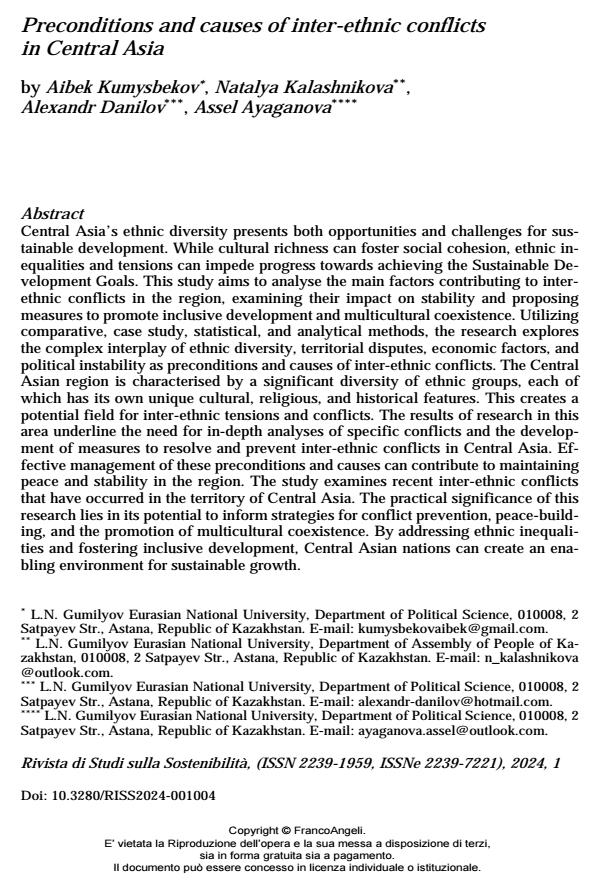Preconditions and causes of inter-ethnic conflicts in Central Asia
Titolo Rivista RIVISTA DI STUDI SULLA SOSTENIBILITA'
Autori/Curatori Aibek Kumysbekov, Natalya Kalashnikova, Alexandr Danilov, Assel Ayaganova
Anno di pubblicazione 2024 Fascicolo 2024/1
Lingua Inglese Numero pagine 20 P. 45-64 Dimensione file 158 KB
DOI 10.3280/RISS2024-001004
Il DOI è il codice a barre della proprietà intellettuale: per saperne di più
clicca qui
Qui sotto puoi vedere in anteprima la prima pagina di questo articolo.
Se questo articolo ti interessa, lo puoi acquistare (e scaricare in formato pdf) seguendo le facili indicazioni per acquistare il download credit. Acquista Download Credits per scaricare questo Articolo in formato PDF

FrancoAngeli è membro della Publishers International Linking Association, Inc (PILA), associazione indipendente e non profit per facilitare (attraverso i servizi tecnologici implementati da CrossRef.org) l’accesso degli studiosi ai contenuti digitali nelle pubblicazioni professionali e scientifiche.
Central Asia’s ethnic diversity presents both opportunities and challenges for sus-tainable development. While cultural richness can foster social cohesion, ethnic inequalities and tensions can impede progress towards achieving the Sustainable Development Goals. This study aims to analyse the main factors contributing to inter-ethnic conflicts in the region, examining their impact on stability and propos-ing measures to promote inclusive development and multicultural coexistence. Utilizing comparative, case study, statistical, and analytical methods, the research explores the complex interplay of ethnic diversity, territorial disputes, economic factors, and political instability as preconditions and causes of inter-ethnic con-flicts. The Central Asian region is characterised by a significant diversity of ethnic groups, each of which has its own unique cultural, religious, and historical features. This creates a potential field for inter-ethnic tensions and conflicts. The results of research in this area underline the need for in-depth analyses of specific conflicts and the development of measures to resolve and prevent inter-ethnic conflicts in Central Asia. Effective management of these preconditions and causes can con-tribute to maintaining peace and stability in the region. The study examines recent inter-ethnic conflicts that have occurred in the territory of Central Asia. The practi-cal significance of this research lies in its potential to inform strategies for conflict prevention, peace-building, and the promotion of multicultural coexistence. By addressing ethnic inequalities and fostering inclusive development, Central Asian nations can create an enabling environment for sustainable growth.
Parole chiave:identity, mediation, social inequality, territorial disputes, security, ethnic diversity.
Aibek Kumysbekov, Natalya Kalashnikova, Alexandr Danilov, Assel Ayaganova, Preconditions and causes of inter-ethnic conflicts in Central Asia in "RIVISTA DI STUDI SULLA SOSTENIBILITA'" 1/2024, pp 45-64, DOI: 10.3280/RISS2024-001004